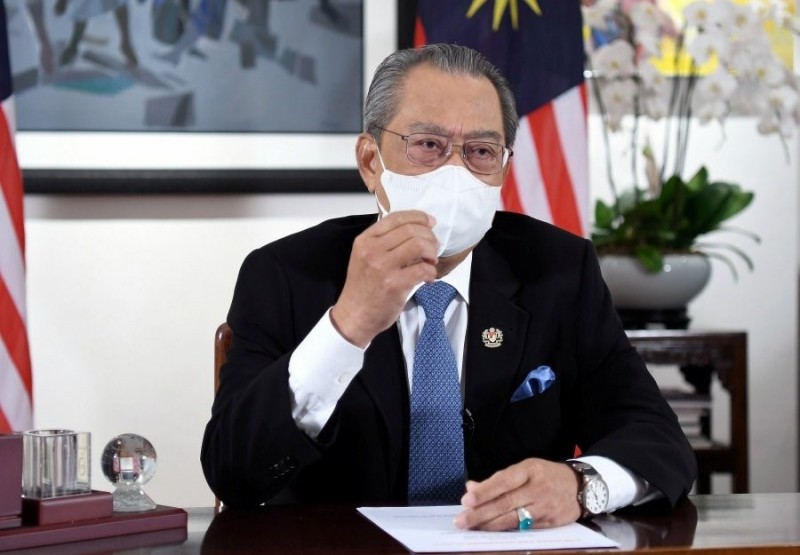
Image credit: New Straits Times
KUALA LUMPUR: The World Islamic Economic Forum (WIEF) says data from the World Bank suggests an expansion of the global economy by 5.6 per cent this year, so all member states must adopt changes in line with the global transition due to the pandemic.
Speaking at the virtual international World Islamic Economic Forum Roundtable today, National Recovery Council chairman Tan Sri Muhyiddin Yassin said there have been positive signs of economic recovery and members must embrace disruptive change to be "future-proof" in response to the ever-changing business and economic landscapes.
He said the roundtable, themed "Revitalisation and Reform: Catalysing Growth" is apt with the world's ongoing transitions caused by Covid-19 and the impact it caused globally.
"This pandemic has brought metamorphic changes to the way our societies and economies operate but yet that does not disrupt WIEF's plans and initiatives engaging virtually with people at all levels – industry leaders, investors, entrepreneurs, academics and professionals – across the globe.
"Since its inception in 2006, WIEF has executed many capacity-building programmes for all member states, including enhancing business collaborations to foster the economy of all Muslim nations, promoting peace and prosperity and bridging the gap between the Muslim and non-Muslim world. However, following the pandemic, we must now adopt inclusive, multi-pronged strategies to regain our position," he said in his keynote speech at the World Islamic Economic Forum Roundtable held virtually, today.
Muhyiddin said while there have been positive signs of economic recovery, the economic downturn has exacerbated poverty and inequality gaps, particularly in developing nations and member countries.
"We need to think out-of-the-box and develop innovative recovery strategies to cushion the devastating impact across all economic and social sectors. Effective collaborations will go a long way towards inclusive and sustainable growth, and in this increasingly fast-paced world, mobilisation of resources plays an equally vital role in ensuring a sustainable development to achieve the intended socio-economic benefits in line with the United Nations' Sustainable Development Goals (SDGs)," he said.
Muhyiddin said the Islamic Economy is an economic frontier that will enable nations to move rapidly forward, together; particularly in the new post-Covid landscape.
"There are many opportunities for the Muslim world, our Muslim member states must work to establish competitive advantages and maximise these opportunities. The global halal economy has grown in leaps and bounds over the years, namely the halal food industry, Islamic finance and banking, pharmaceuticals, tourism as well as education.
"Malaysia, for instance, remains a key player under the Global Islamic Economy Indicator (GIEI) since the past decade, driven by a strong Islamic finance ecosystem and creative initiatives," he said.
He added that global recognition has also placed Malaysia on track towards realising its full potential as a global Islamic economy and finance hub in the Asean region and beyond.
"Besides being a pioneer in the halal industry, Malaysia continues to lead as one of the largest Sukuk issuers in the world, accounting for 32 per cent of the global Sukuk issuances in 2020.
"One of the Malaysian government's initiatives was the launching of RM500 million worth of Sukuk Prihatin Islamic bonds during my premiership in August last year," he added.
As part of the Key Economic Growth Activities (KEGA), he said Islamic economy sectors will continue to flourish in Malaysia, through government support and the role of agencies such as the Islamic Development Malaysia Department and the Malaysia Digital Economy Corporations (MDEC).
He also expects the participation of more Malaysian Bumiputera entrepreneurs and MSMEs in the field of digital economy to make new breakthroughs as well as penetrate halal markets, both locally, abroad, and online, next year.
Muhyiddin said the economic empowerment of the ummah is also crucial to ensure a fair and equitable distribution across all targeted groups to spur Malaysia towards becoming a prosperous and inclusive nation in line with the Shared Prosperity Vision 2030.
"In line with Malaysia's Digital Economy Blueprint (MyDigital), the evolving roles of science and digitalisation have highlighted the importance to embrace digital transformation across various sectors. For instance, smart factories in the manufacturing sector whilst enhancing capabilities of domestic firms to make increasingly complex and sophisticated products at a minimal cost.
"Thus we must move beyond traditional frameworks and conventional wisdom amid challenges, exploring innovative approaches and cultivating new ideas to foster positive change in the Muslim world," he added.
Muhyiddin said a paradigm shift must be made by leveraging market opportunities with new innovations, reforming business models and disruptive technologies as a potential game changer to accelerate growths of all sectors.
"The strength of human capital must be optimised by prioritising skills enhancement in the workforce, particularly in areas of high value growth such as technology, financial services, and energy. We must empower the young to pioneer this exciting new frontier as Muslims and Malaysians enter the 'Metaverse'," he said, adding that bottom-up initiatives through community empowerment for micro, small and medium businesses should constantly be afforded with opportunities to adapt and grow to set their businesses apart.
He said Government-Linked Companies (GLCs) can also be at the forefront in regional integration to enhance the focus and mandate to drive economic growth and development, moving forward.
Source: https://www.nst.com.my/news/nation/2021/12/754600/muhyiddin-adapt-changes-stay-apace-predicted-global-economic-recovery

